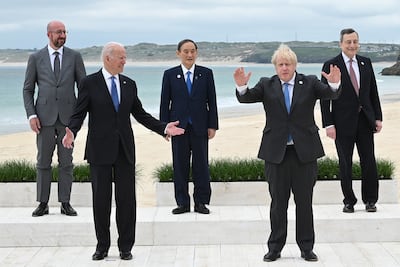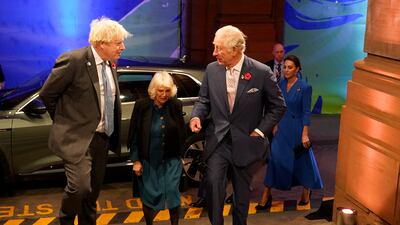As heir to the throne and Queen Elizabeth II's first minister, Prince Charles and Boris Johnson should be used to their paths crossing, but when the pair shake hands in Rwanda later this week expectations are for both to wear a grimace, not a smile.
Standing in for the monarch and head of the British Commonwealth, Prince Charles suffered setback in the lead up to the meeting when a newspaper reported he had privately described a UK government deal with Rwanda to deport illegal arrivals as appalling. The remarks potentially brought the monarchy into dispute with the government but also offered offence to Rwanda, which is hosting the Commonwealth Summit for the first time since it joined in 2009.
While the prince has repeatedly called for humanitarian treatment of refugees, the British prime minister has stuck by his government's deportation policy despite a last-minute intervention by the European Court of Human Rights grounding the inaugural flight last week.
The interaction between the prince and Mr Johnson, who do not enjoy a warm relationship, will be scrutinised at the meeting in the Rwandan capital of Kigali of 54 Commonwealth countries, which vary in size from the Pacific archipelago of Tuvalu (population 11,000) to India (population 1.3 billion).
That awkwardness could intensify as Prince Charles is likely to be asked about his views on the Rwanda deportations during bilateral meetings, particularly with developing countries. He may also comment on it to the media, although as heir to the British throne he is meant to remain politically neutral.
Mr Johnson pointedly sidestepped the issue in an opinion piece he wrote for The Daily Telegraph on Monday in which he set out his own personal mission statement for the group. The UK prime minister, said the Commonwealth was “ever more significant and valuable” with its members “encompassing about a third of humanity”.
He said Britain was using its “regained sovereignty” post-Brexit to sign Commonwealth free-trade agreements, with 33 achieved so far, and planned to cement one with India “the biggest of them all, by Diwali in October”.

From Rwanda, Mr Johnson will fly to a castle in the Bavarian Alps for a G7 summit at the weekend. It will contrast sharply from the scenario in Cornwall last year, when he hosted the first in-person G7 meeting since the outbreak of the pandemic, with the agenda dominated by Covid-19 and climate change.
During the three-day summit at Schloss Elmau, the seven nations will focus on imposing greater sanctions on Russia, as well as the need to plan for Ukraine’s post-war reconstruction.
Germany has also invited the leaders of India, Indonesia, Argentina, Senegal and South Africa and, given China’s economic woes, will look to refocus the G7 on collaborative science and technology agreements.
After the three-day summit, the G7 leaders from Nato countries will head to the Spanish capital to join their colleagues for one of the alliance’s most important meetings.

Foremost will be how the 30 members formulate a strategy to help Ukraine defeat Russia, discussing the weapons and funding they will provide and for how long.
Uncompromising countries, such as the US, UK and Poland, will ask others, including France and Germany, to hold firm without urging Ukraine to cede any territory to Russia.
If the alliance remains resilient, then Ukraine can expect a significant increase in more advanced weaponry, including Europe’s highly accurate artillery pieces.
Another priority will be cajoling Turkey into dropping its opposition to Sweden and Finland joining Nato, possibly with some American pressure combined with the offer of military aid.

The three major summits could set the agenda for several years.
As Mr Johnson's official spokesman told The National: “All three are significant summits, broadly united with the theme that we are all facing global challenges at the moment.
“Whether it's war in Europe, coming out of the pandemic or inflation, the summit will get together world leaders to discuss what can be done on these important issues to make progress, not least on how we go further in supporting Ukraine.”







